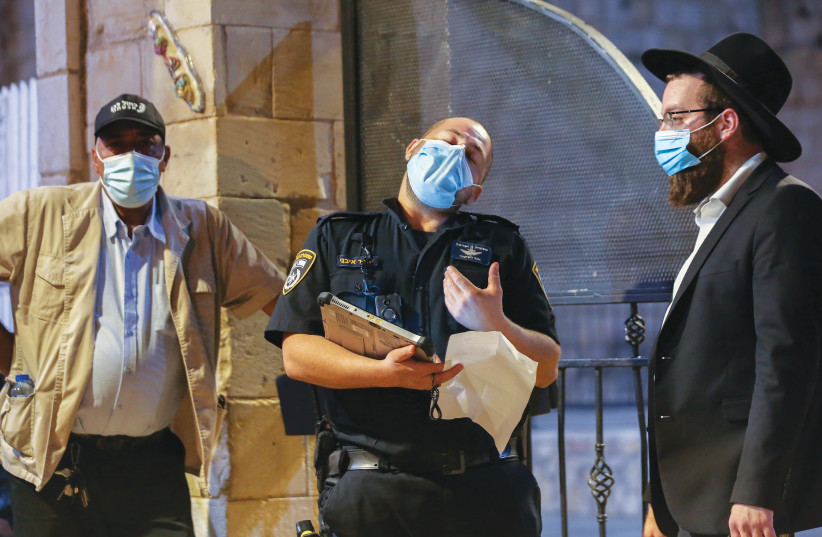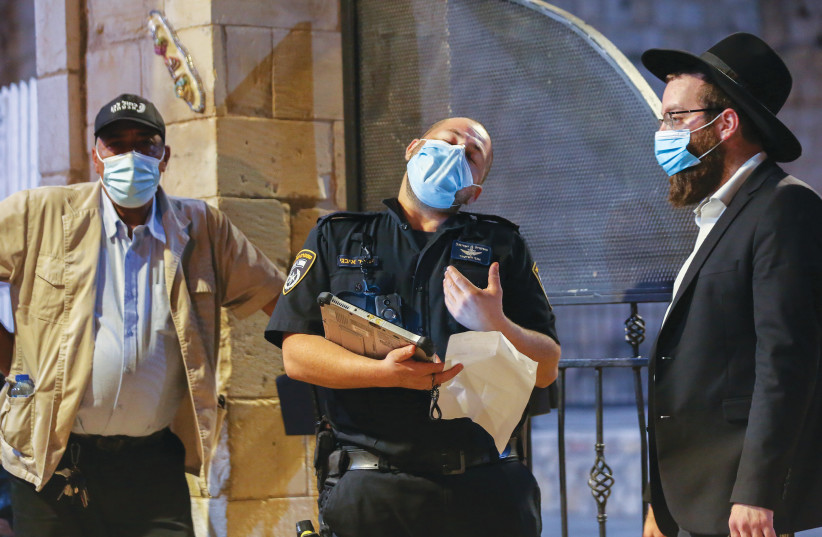
If Israel does not take the necessary steps to stop the spread of COVID-19, the pandemic could spiral out of control again and put Israel right where it was last September – a step before lockdown, senior health officials told The Jerusalem Post.
And some experts are warning that Israel has only a two-week window in which to act.
The number of new daily cases has surpassed 2,000 for two days in a row, and hospital heads say they are starting to feel the results.
“If we do not take steps fast, then in the next two weeks we could see 800, 1,000 or even more severe patients in the hospital in the internal and intensive care units,” said Rabin Medical Center-Beilinson Campus Director-General Dr. Eitan Wertheim. “We are going to be right in the same spot that we were exactly one year ago. We are on the same route.”
On July 28, 2020, Israel diagnosed 2,125 new cases of the virus, compared to 2,267 that were diagnosed on Wednesday. However, on July 28 last year, there were 320 serious cases, whereas on Wednesday there were only 149.
if(window.location.pathname.indexOf(“656089”) != -1){document.getElementsByClassName(“divConnatix”)[0].style.display =”none”;}else if(window.location.pathname.indexOf(“/israel-news/”) != -1){ document.getElementsByClassName(“divConnatix”)[0].style.display =”none”; var script = document.createElement(‘script’); script.src = ‘https://player.anyclip.com/anyclip-widget/lre-widget/prod/v1/src/lre.js’; script.setAttribute(‘pubname’,’jpostcom’); script.setAttribute(‘widgetname’,’0011r00001lcD1i_12258′); document.getElementsByClassName(‘divAnyClip’)[0].appendChild(script);}
The percentage of patients who go from being severe to being mechanically ventilated is very low, according to Wertheim. And he said that Israel is much less likely to see nearly as many patients die, even if they do develop a serious case of the disease, in this wave as in the previous one.
“The definition of a severe case is a World Health Organization definition, and it is a big mishmash,” said Shaare Zedek Medical Center CEO Prof. Jonathan Halevy – people who come to the hospital, get oxygen and then go home, on the one hand, and people who come to the hospital and end up on a respirator, on the other hand.
Halevy said that one of his hospital’s serious patients is an 87-year-old who has been on a respirator for three months, meaning he is not even from the current wave.
“The Delta variant is very infectious,” he admitted, “but infection among those vaccinated is much less severe. When the numbers rise, we see an exception here or there, like the young pregnant woman who was vaccinated and ended up with severe disease and on a respirator. But I believe she will recover much easier than patients like her during the third wave.”
Nonetheless, “the rise in the patients is very clear,” Wertheim said. “Yesterday, we had 13 coronavirus patients in severe condition, and right now we have 21. Within one day, that’s 50% more patients in severe condition.”
In Jerusalem’s Herzog Medical Center, hospital head Dr. Kobi Haviv was asked by the Health Ministry to open a second coronavirus ward, one that he told the Post is already almost full.
“We are already at almost 60 patients now, and we are likely to be at 80 by the end of this week or the beginning of next,” he said. “We are seeing about 15 new patients each day. Something has changed in the last few days. We were getting only a few new patients, and now that number is more than 10 each day. We are in the second phase of a fourth wave.”
Haviv explained that while he is not panicking yet and believes the hospitals can easily manage the current load, he is looking ahead to when school is supposed to start. Last year, the country opened schools on September 1, believing they could manage the pandemic. A couple of weeks later, the school bells stopped ringing and Israeli children spent the majority of the year sitting at home.
The reproduction rate, otherwise known as the “R” or the number of people a sick person infects, is holding at around 1.4. This means, said Haviv, that “what is happening today or happened yesterday is going to influence the hospitals in about 10 days.”
The spread of coronavirus, as the world has already learned, can be stopped only by two means: mass vaccination or extreme masking, gathering and social distancing measures.
Prime Minister Naftali Bennett has rolled out mask laws, and the Green Pass program is meant to be reinstated in full on Thursday, but if one can judge by the past – or recent photos shared on social media, time spent in closed office spaces and trips to the mall – few Israelis are following these rules.
And now, it is starting to appear that two shots of the Pfizer vaccine – at least if they were taken more than six months ago, or you are old or immunocompromised – also might not be quite enough to stop the disease.
“We had a very good vaccine, and now we have a mediocre vaccine,” Wertheim said. “We don’t have enough protection, and we are not taking severe measures to prevent the spread.”
The ministry’s coronavirus vaccination committee was meant to meet late Wednesday to discuss a third shot. A member of the committee told the Post that the move was expected to be approved for people 65 or older – something that both Haviv and Wertheim said they support.
“We have no time to wait for the FDA [Food and Drug Administration],” Haviv said. “This is going to save lives.”
This is despite the understanding that Pfizer and Moderna are currently working on new versions of their vaccines that would better combat coronavirus variants, which are supposed to be out by the end of the year. It is unclear if those who get a shot now could take a booster again then.
Moreover, despite research showing that the neutralizing antibodies in people who got the jab five or six months ago are starting to wane, it is unclear because no research yet exists as to whether it is the lack of these particular antibodies, or also how resistant the Delta variant is to the current vaccine, that is leading to so many breakthrough infections. Therefore, there is always a possibility that a third shot might not fully protect those at risk anyway.
“My main concern is whether it will be effective in preventing the large numbers we expect by the end of next month,” said Wertheim. “It might or it might not be.”
He said that any effort to give boosters will need to happen in the next two weeks if the government wants to prevent the spike in cases that could once again put the school year at risk.
“Getting a third vaccine is better than not getting a third vaccine,” Wertheim said.
A new report released to investors by Pfizer on Wednesday showed that a third dose of the vaccine increased antibodies in those who received it by five to 11 times. The company said it hopes to apply for emergency use approval of the extra shot sometimes in August.
So, in the meantime, Israel will need to prepare by stepping up its infrastructure and funding of the health system, while monitoring the airport, because until the world is vaccinated, there will be more mutations and more waves of the virus – abroad and within the Jewish state.
“We will have to produce another vaccine that will cover the newer variants, and then we will have to be much quicker at using it,” Wertheim said. “If the vaccine is not delivered at almost the same time to all the countries – if there is no global rollout strategy – then there will also be one or two big countries where a new variant develops. It will start by infecting those nations, but it will eventually spread to other nations, even those who think they are already in good condition.”
He said: “We might be happy again in January or February,” but without global vaccination, Israel could expect to be struggling again by Passover.
He described a situation in which Israel, which had prided itself on helping lead the world out of the pandemic, might now be perpetually in a situation akin to a dog chasing its tail, always trying to get ahead of the next variant but finding itself on the losing end until a global solution is found.
“If every country will do only a local strategy,” Wertheim concluded, “it is only going to keep us a little bit protected but not completely cured.”




